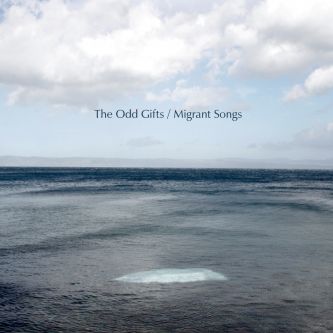
Pleasant indie-pop compositions of The Odd Gifts carry a message about the crisis of the direction our society is taking. The Odd Gifts, a project of the founding member of Eggnoise Ondřej Galuška, ventured to break through the non-conflicting glitter of current pop-culture on its new record. The lyrics do not present a one-sided view of the topics presented, but try to grasp a broad concept of migration in the world over a longer period of time. Ondřej Galuška with The Odd Gifts invited many guests to appear on the album, including singers Justin Lavash, James Harries and Alasdair Bouch and many other musicians. Migrant Songs are a unique, timely but just as much timeless album.
Ondřej Galuška started to work on the album over a year before its release. “From the beginning there were several intertwined themes that gave rise to the whole concept,” Ondřej Galuška describes the basic idea of the recording. “Of course there is the reference to the so-called migration crisis, but what I felt I needed to react to more than the global situation - by itself scary and complicated - was the local failure of rational discussion, the spreading of hoaxes and manipulated information, the lack of understanding and basic human openness, which needn’t necessarily entail boundlessly open arms, as the often-heard formula of “the polarization of society” seems to imply. Today all of these issues have become even more pressing and the migration crisis has become a crisis of our own direction as a society.”
The basic concept was important for the whole development and shape of Migrant Songs. Ondřej gradually found band mates and further guests. The Odd Gifts are now made up of Eggnoise members Jaryn Janek, Michael Nosek and Jan Mizler, who constitute the rhythm section on Migrant Songs. Once again there are many guests on the album, this time mostly singers who often appear in more than one song and come together in different songs. So it is not the case of the common model of one guest per song, but the whole record is much more sonically interconnected and the recurring voices help shape its story. Ondřej Galuška reveals who the guests are: “Many of the guest musicians are foreigners resident in the Czech Republic, but the impulse for their invitation was more musical than conceptual. I was friends with most of them already before the recording. Justin Lavash, James Harries and Alasdair Bouch are on the record because of their wonderful voices and as native speakers of English, which I had learned to speak as a child living in the USA for three years. Bijou Camara and Moustapha Faye shift the rhythm and mood of the songs away folk or even jazz feeling. Among Czech guest musicians there are Marek Doubrava, Vojtěch Procházka, Marie Puttnerová and Ondřej Slavík.”
On the two possible meanings of “Migrant Songs” (Songs of Migrants/Migrating Songs):
It wasn’t easy to choose the title Migrant Songs, because this topic was so omnipresent already a year ago. But I could not turn back, as the songs really started to work and communicate under this overarching title. They became truly Migrating Songs, producing ever new analogies, meanings, exchanging sounds, themes, guest musicians, and even authors. (Three of the songs are to a different extent remixes of other songs.) For me, looking for analogies is a way to a more complex perspective. I enjoy moments when what at first looks like a comical parallel yields the possibility of a new point of view, a new encounter.
Ondřej Galuška admits that already with Eggnoise they talked about recording a conceptual album on changing one’s life, leaving the city and going to the countryside and on the subsequent disillusionment. “Then all of a sudden these two things came together. I was writing songs about the hope for a better life and the hard encounter with reality and I realised this was something similar – in a very loose analogy – to the situation of war refugees and economic migrants. I wanted to frame in words as well as in sound the intensity of massive movements of people in a world that has become loose and out of joint – both in the innocent form of ecologic trends as well as in the insane form of migrating nations. Other topics were added such as taking babies away from mothers in Czech birth hospitals, Antonin Dvorak’s voyage to America, growing old and so on, and a record focused on a broad concept of migration was born.” To make the work complete, a suitable cover had to be found for the album. The perfect match was found in a photo shot by photographer Antonio Cossa at the island of Lesbos. It depicts a sunken boat, which looks more like an illusion or an angel ship because of its shade and glow, thus wielding an incredible and at the same time chilling symbolic power. Power which runs through the whole of Migrant Songs.
| preview | name | time | |
| 01 Prayer | 03:32 | ||
| 02 Babies in Incubators | 04:47 | ||
| 03 Migrant Song | 02:42 | ||
| 04 So Divine | 04:17 | ||
| 05 City Chaos | 01:08 | ||
| 06 Winnie-the-Pooh on a Farm | 04:45 | ||
| 07 Lullaby | 04:31 | ||
| 08 We Left | 02:04 | ||
| 09 1892 | 04:11 | ||
| 10 Growing, Teething | 04:36 | ||
| 11 Hedgehogs | 04:37 | ||
| 12 My, What Have I Done | 04:46 | ||
| 13 Falling | 02:30 | ||
| 14 The Gift of the Other | 05:13 |